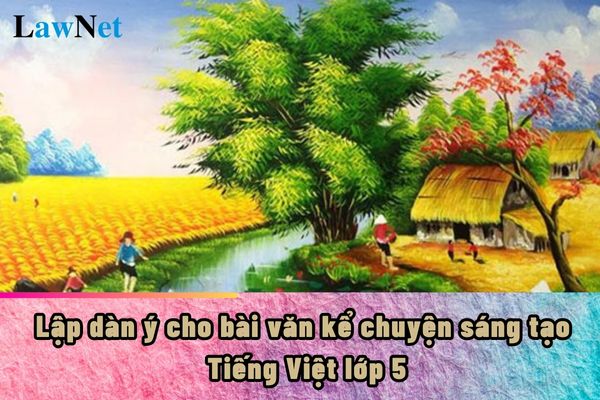How to prepare an outline for a creative storytelling essay in grade 5 Vietnamese subject in Vietnam?
How to prepare an outline for a creative storytelling essay in grade 5 Vietnamese subject in Vietnam?
The method for outlining a creative storytelling essay for Grade 5 Vietnamese, as part of the "Kết nối tri thức" curriculum, is a lesson in the second week of Grade 5.
Below are guidelines on how to outline a creative storytelling essay for Grade 5 Vietnamese to help students easily access and understand the lesson:
|
An outline for a creative storytelling essay in grade 5 Vietnamese subject in Vietnam * Outlining: |
*Note: The information is for reference only./.
>>> See more Preparing lessons for Grade 10 Math according to Canh Dieu textbook (Volume 1) in Vietnam
>>> See more Guidelines for preparing the lesson Thanh âm for Grade 5 in Vietnam
>>> See more Guidelines for preparing lessons on nouns, verbs, and adjectives for Grade 5 Vietnamese subject in Vietnam
>>> See more Guidelines for practicing words and sentences (pronouns) for Grade 5 Vietnamese subject in Vietnam
>>> See more Descriptive essay about the teacher for Grade 5 students in Vietnam in academic year 2024-2025

How to prepare an outline for a creative storytelling essay in grade 5 Vietnamese subject in Vietnam? (Image from Internet)
What are the objectives when teaching Grade 5 Vietnamese subject?
Based on Section III of the Appendix to the General Education Program for Literature issued with Circular 32/2018/TT-BGDDT, the Grade 5 Vietnamese program objectives are as follows:
Objective [1] Help students form and develop essential qualities with specific manifestations: loving nature, family, and homeland; being conscious of origins; enjoying beauty and goodness and having healthy emotions; being interested in learning, enjoying labor; being honest and straightforward in learning and life; being conscious of fulfilling responsibilities towards oneself, family, society, and the surrounding environment.
Objective [2] Help students initially form general competencies and develop language skills across all skills of reading, writing, speaking, and listening at a basic level: reading accurately and fluently; understanding the content and main information of the text; relating and comparing outside the text; writing correctly in spelling and grammar; writing some sentences, paragraphs, and short essays (mainly narrative and descriptive essays); speaking clearly; listening and understanding the opinions of others.
Develop literary competence with the requirement to distinguish between poetry and stories, know how to read poems and stories; recognize the beauty of artistic words; have imagination, understand, and be emotionally moved by the beauty and goodness of people and the world around as expressed in literary texts.
How to evaluate literary competence when studying Grade 5 Vietnamese in Vietnam?
Based on Section IV of the Appendix to the General Education Program for Literature issued with Circular 32/2018/TT-BGDDT, literary competence evaluation when studying Grade 5 Vietnamese requires students to achieve the following:
- Distinguish between story texts and poems (prose and verse); recognize the content of the text and the writer's attitude and feelings; initially understand the effect of some formal elements of literary texts (words, characters, plot, rhyme, comparison, personification). Know how to relate, imagine, and express literary qualities in writing and speaking.
- For students in grades 3, 4, and 5: know how to read literary texts expressively; retell and summarize the main content of a story or poem; comment on characters, events, and the writer's attitude and emotions in the text; recognize the time and place, some types of rhyme, poetic rhythm, words, unique images, and the effect of rhetorical devices such as personification and comparison.
Understand the meaning or lesson drawn from the text. Write paragraphs and stories, describing emotions and the ability to relate and imagine.

